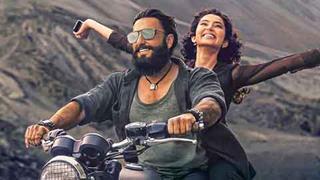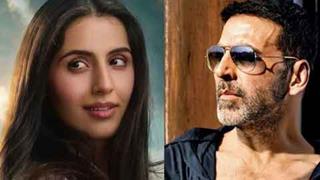Will a laugh riot set in a remote rural Indian village - "Malamaal Weekly" - salvage the Hindi film industry's first quarter business report?
As the third month of 2006 draws to a close, the film industry has only one runaway success -"Rang De Basanti"- and a moderately successful "Taxi No. 9211" to boast
of.
Though the predicament is better than the period same time last year, the number of flops piling up makes it a low strike rate. All hopes are, therefore, pinned on
Priyadarshan's just-released "Malamaal Weekly".
The Sahara One Motion Pictures production features critically acclaimed actors Om Puri and Paresh Rawal in the main roles. The film also stars the talented Rajpal Yadav
and upcoming actors Riteish Deshmukh and Reema Sen.
The comic caper has garnered rave reviews from film critics. It is believed to appeal to both the multiplex cine-goers as well as the small-town audiences.
The film is also being viewed as a mass entertainer despite the absence of any stars. Its success would signal the arrival of unconventional-looking, talented actors who
usually languish entire lifetimes as "character actors".
But actors like Paresh and Rajpal have emerged as crowd-pullers, inducing filmmakers to think of films built around them.
Of course, talented actors have always held their own on celluloid - Motilal, Balraj Sahni, Sanjeev Kumar, Naseeruddin Shah, Amrish Puri, Nana Patekar and Anupam Kher.
Few, however, held complete sway.
The recent crowd-pulling ability of some actors has changed the scenario for the better. It has brought a new kind of respectability, stardom even, to the character actor.
Thus we have Nana occupying as much screen space as hot-and-happening star John Abraham in "Taxi No. 9211". Though initially slotted in insipid roles, Paresh's
performance alone got him noticed.
Even as the fate of "Malamaal Weekly" hangs in the balance, Paresh, Om and Rajpal enjoy top billing in the movie's credits.
Of late, nothing seems to succeed like rib-ticklers at the marquees. Comedies have emerged as the most-profitable genre for Bollywood. It has been a much-ignored genre
with only a handful of films worth quoting. The ones that stand out though can be watched over and over again.
Priyadarshan's "Malamaal Weekly" could join the small club. Down the years, Bollywood's funny films can be broadly classified as classic, cult, comedy of disguise,
situational comedies, satirical and slapstick.
To begin with were the classic comic capers like those of Mehmood ("Bhoot Bangla", "Padosan") and Kishore Kumar ("Chalti Ka Naam Gadi", "Padosan").
Their comic timing and inherent ability to create fun where there is none by making faces made these films unforgettable.
Then there were cult classics like "Jaane Bhi Do Yaaron" that presented the corrupt side of life in a lighter vein through the eyes of two goofy individuals (Naseerudin Shah,
Ravi Baswani).
In the same vein, "Pyar Kiye Jaa", a Mehmood-Kishore-Shashi Kapoor starrer was a tongue-in-cheek spoof of Bollywood. In "Chameli Ki Shaadi", Amjad Khan taught Anil
Kapoor 10 ways to win Amrita Singh's heart.
"Pushpak", a silent film by Kamal Haasan, brought the house down without much being said.
Another prominent category within the comedy genre is the comedy of disguise. This brand has actors pretending to be someone else. Like "Half Ticket" had Kishore
romping about as 'munna' (little boy) in shorts, a printed shirt, suspenders, a monkey cap and a pair of round glasses. Kamal's remake of Hollywood-hit "Chachi 420" also
comes in this sub-category.
Hrishikesh Mukherjee emerged as the undisputed king of comedy with films like "Chupke Chupke" in which Dharmendra is a botany professor posing as a chaste Hindi
speaking driver, while best friend Amitabh Bachchan is an English literature professor who pretends to be Dharmendra.
Confusion took on its wittiest form in "Golmaal" in which Amol Palekar parades as his own twin. Hrishikesh also gave us "Kisi Se Na Kehna" and "Khoobsurat" that revolved
around close-knit families.
His contemporary Basu Chatterjee also made a series of light-hearted comedies like "Khatta Meetha", "Naram Garam", "Chhoti Si Baat" and "Baaton Baaton Mein" that
brought out the humour in the daily life of middle-class families.
Post-Mukherjee, David Dhawan came up with a string of slapstick comedies like "Coolie No. 1" and "Hero No. 1". Coupled with superb comic skills of actors like Govinda,
David made impossible situations possible. The senseless comedies, however, lost their charm when David made too many too soon.
Superstar Aamir Khan is remembered for comedies like "Hum Hain Rahi Pyaar Ke" and "Andaz Apna Apna" while Shah Rukh Khan has slapstick masala potboilers like
"Baadshah" under his belt.
"Hera Pheri" - Priyadarsan's Hindi remake of the Malayalam hit "Ramji Rao Speaking" - can be credited for giving Hindi film viewers a break from slapstick and sex
comedies. With the box-office thumbs-up to his post-"Hera Pheri" ventures like "Hulchal" and "Garam Masala", he is set to entire the select group of Bollywood's funniest
men.
'Malamaal Weekly' not so orginal film!
Monday, March 13, 2006 17:32 IST

















